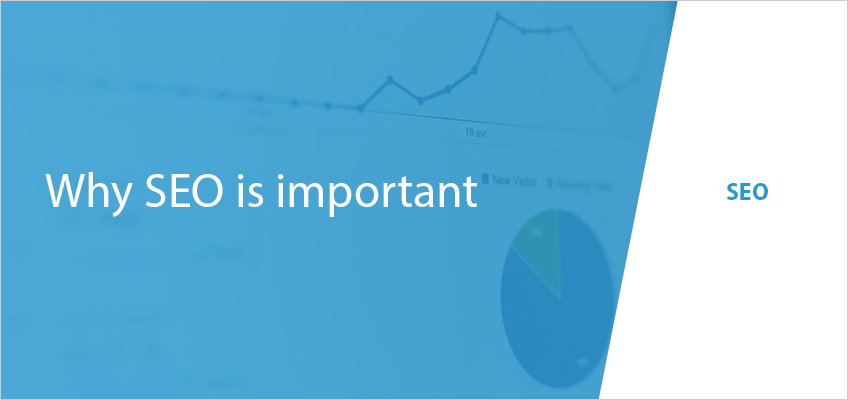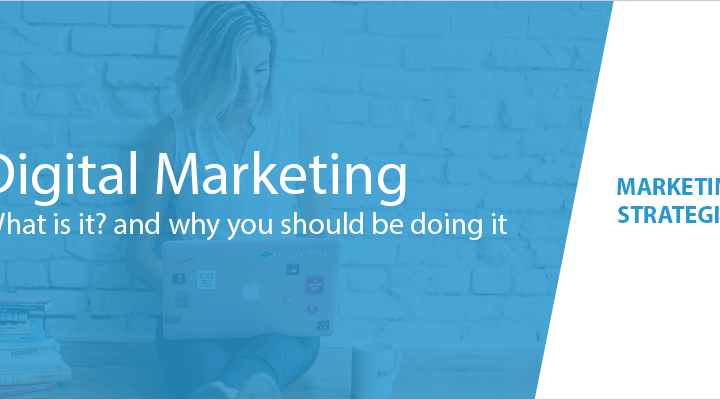If you don’t already know why SEO is important for your business then you need to learn quickly!
Because, I can guarantee you that most (if not all) of your competitors have a good grasp of SEO and are using it right now to boost their search rankings.
But don’t worry about being left behind.
I am going to get you up to speed by looking at the benefits of SEO and how you can get started.
What is SEO and how does it work?
Search Engine Optimization (SEO) is the process of improving your website so that it performs better in search engines such as Google, Bing or Yahoo. The better you optimize your website, the higher it will rank in search results.
These search engines use various factors or algorithms to decide which web pages should be highest. They look at your technical SEO (e.g sitemaps, page speed), On-Page SEO (your content) and Off-Page SEO (website promotion, backlinks).
Benefits of SEO
1. Organic search can make up most of your website traffic
Over 50% of all traffic comes from organic search. The rest is made up of paid traffic, referrals, social media and direct traffic. Within organic traffic, Google has a 86% market share compared to Bing with around 6% and Yahoo with just over 3%. These figures tell us that web users trust search engines and are more likely to start their online journey by typing a search into Google.
With this in mind, it’s highly important that you optimize your website for search engines, otherwise you are missing out on a bucket load of traffic. The best way to gain more organic traffic is by writing great informative content, doing keyword research and by optimizing your content.
Following the above will without a doubt improve your rankings. Good content will also encourage your readers to share your content on other websites and social media, creating lot’s of backlinks to your website. Backlinks tell search engines your content is important and worth sharing, further boosting your rankings.
Doing keyword research and content optimization might seem a bit daunting for beginners but thankfully there is lot’s of help out there, which takes us to the next couple of points…
2. Lot’s of free SEO tools
For start-ups and small businesses, your budget is going to be fairly tight. It’s unlikely you will be able to shell out a ton of cash on SEO agency fees or expensive SEO tools. Thankfully most SEO tools are free.
There are a lot of tools out there but that’s because SEO covers a wide range of tasks including:
- Keyword research
- Analytics
- Sitemaps
- Site speed
- On-page SEO
- Off-page SEO
- Local SEO
- Link tools
Let’s take a look at the best tools that you can use for these tasks:
Keyword research – UberSuggest
Keyword research is where most of us begin on our SEO journey. You might have a few ideas of keywords in your head but you really need to find out if they will get you sufficient and relevant traffic. There are a lot of paid and free keyword research tools out there such as Google Keyword Planner and SEMRush, but the one I am using most at the moment is Neil Patel’s UberSuggest. It’s free (for a limited amount of searches), gives you lots of information about keywords and offers plenty of suggestions for related keywords.
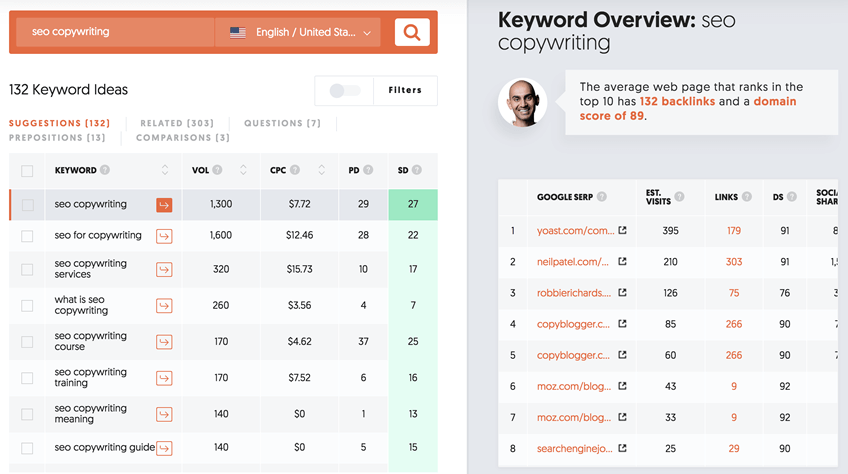
Analytics – Google Analytics
I am going with Google again for this one as it would be impossible not to. Google Analytics is the most used analytics tool you can find. It’s actually amazing it is free considering the amount of data you can retrieve. You can find all kinds of insights about your visitors including where they come from, devices they are using, how long they spend on your pages and much more. It’s a good idea to connect your website to Google Analytics right from the off. Otherwise you might miss out on vital user data.
Sitemaps, analytics and keyword research – Google Search Console
Sitemaps make it easy for search engines to index your website. Google Search Console allows you to submit sitemaps for your website and gives you information on how your site is being crawled and indexed. This includes any errors in your pages.
Another great thing about this free tool is the search data. You can see exactly what people are typing into Google to get to your website. This gives you a great indication of which keywords are working best for you and which are not.
Page speed – Google PageSpeed Insights
Search engines don’t like slow websites. Most of us give up on a site if it takes more than a few seconds to load. So it’s important for you to do what you can to keep it fast. PageSpeed Insights is a free Google tool that tells you how fast a website site loads on mobile and desktop devices. It also gives your site a performance score and details on how to fix anything that is slowing you down.
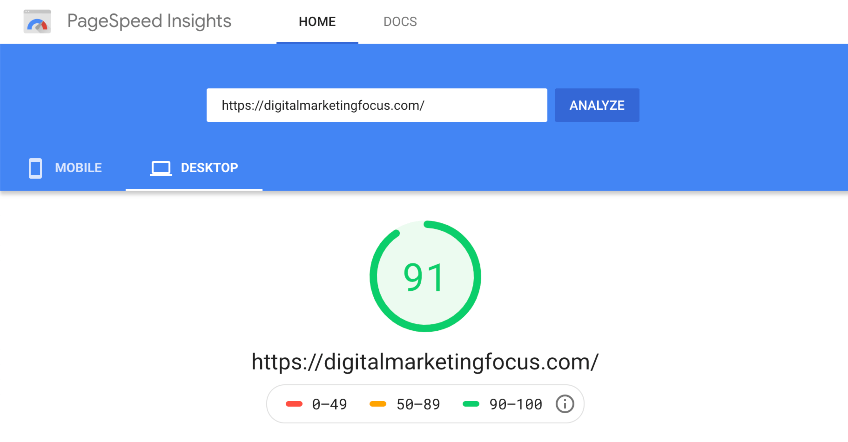
On-Page SEO – Yoast
Yoast is the most widely used SEO plugin for WordPress. It helps with sitemaps, robots.txt files and other technical aspects. But the best thing about the plugin for me is how it helps optimize content. It allows you to add keywords to pages or posts and shows you how to optimize the content for those keywords. Additionally it gives your content a readability score and advice on how to improve it.
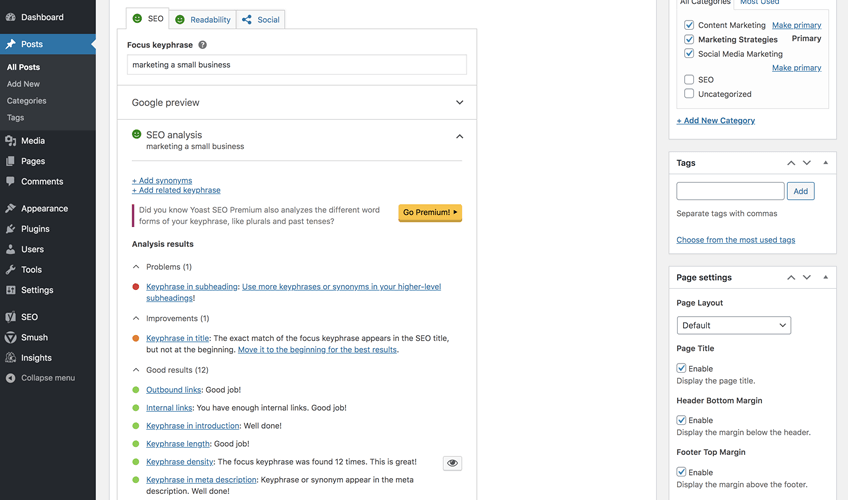
Off-Page SEO, link tools – Moz Link Explorer
Off-Page SEO covers many things such as link building, social media engagement, and guest posting. All of these are very important for your site ranking but building links is vital. Moz Link Explorer allows you to type in any URL and returns lots of juicy backlink information for that website. This allows you to identify backlinks that your competitors are getting. Or you can type in your own URL to see who is linking to your website and what their domain authority score is.
Local SEO – Google My Business
When someone searches for a local business in your industry, you want them to see your site listed first. Google My Business is the perfect place to do just that. Signing up is free and all you have to do is add as much information about your business as possible. When someone searches for a business in your niche and your local area, your business will be listed with your vital details including a map, reviews and contact information. And these listings appear above normal results.

3. Lot’s of online support and resources
As well as all of the excellent tools listed above, the SEO community is bursting at the seams with helpful information and resources. Here are just some of best resources that will boost your SEO knowledge:
- Google SEO Starter Guide – what place would be better to start than here? This guide is one of the most comprehensive you will find anywhere and importantly – it is made by Google!
- Backlinko – Brian Dean is the SEO master as far as I am concerned. His blog offers some fantastic tips and thorough guides on all things SEO. If you want to stay ahead of the game then follow Brian’s blog closely.
- Neil Patel – Neil’s blog is another one I follow religiously. He has made millions from his SEO knowledge and the amount of free advice he offers on his blog is actually amazing.
- Moz – as well as offering excellent SEO tools, Moz also has some of the best SEO guides you can find. The blog is also extremely helpful with posts from leading marketers from around the globe.
4. Keeps you ahead of the competition
There are billions of web pages online and no matter what your niche is you will have competition fighting you for higher search rankings. The chances are most of your competition will be doing some form of SEO. But the good news is you can find out exactly what they are doing and how you can beat them in search rankings. SEO research tools can keep you ahead of the competition.
One that I often use is SEMrush. They offer solutions for SEO, PPC, content, social media and competitive research. Not only does SEMrush give you lots of data about your own website, but you can also type in a competitor’s URL and see where they are having success. Find out where your rivals are getting backlinks from, which keywords are giving them the most traffic and which pages and posts are attracting the most engagement.
On top of this you can do direct comparisons with your site and your rivals on keywords to see the key differences. This lets you know where you have to improve to gain the advantage. A paid subscription is required to gain access to all of their tools but the free ones still do a great job despite some limitations on the data you can retrieve.
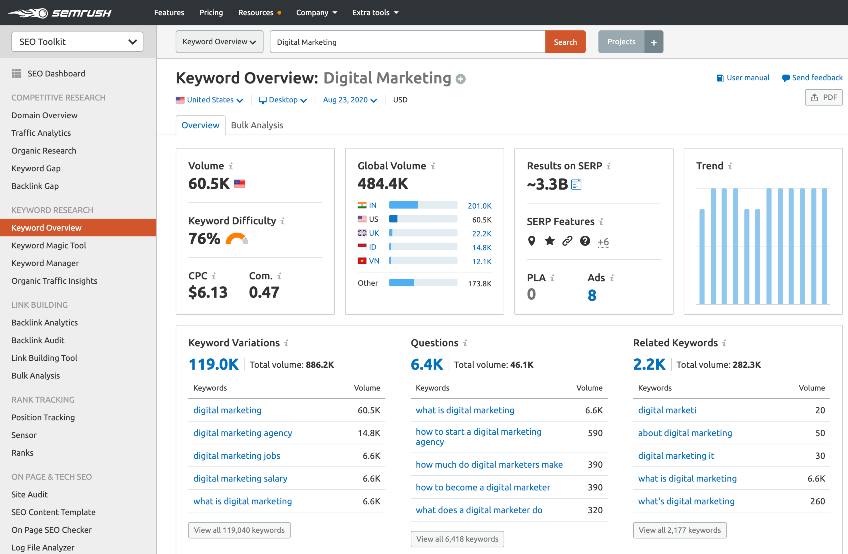
5. Without it you are invisible
If you have a website that gets very little traffic then chances are it hasn’t been optimized for search engines. This could be because of poor technical SEO or a lack of on-page and off-page SEO.
Let’s mark off the technical basics first. To make sure Google is indexing your pages do a Google search for “site:yourwebsite.com” (replacing “yourwebsite” with your own domain). This will bring all of your pages that are being indexed.
If you don’t have any pages indexed then maybe your website is new and Google hasn’t got around to it yet or there might be an issue with your sitemap.. A sitemap is needed in order for search engines to index your pages correctly. In your address bar type in your domain name followed by /sitemap.xml to make sure you have a sitemap. If you don’t have one then you should create one. If you are using WordPress then Yoast will generate a sitemap for you. Submit your sitemap to your Google Console account to keep an eye on page indexing.
If your technical SEO including sitemaps, clean code, site speed and meta are all in order then you have won half the battle. If you are still not appearing in search results then you have to look at your keyword choices, link building strategy and on-page SEO. Cover all of these and you certainly won’t be invisible.
6. It‘s cheaper than most marketing strategies
Generally speaking, the most costly aspect of SEO is your time. It isn’t a quick win strategy but it is cost effective and the rewards can be endless. As we covered in earlier points, there is a boatload of free SEO tools and resources at your disposal. Dive into the SEO community, learn the tools, ask questions and make friends. Before long you will have a good understanding of what is needed to incorporate SEO into your digital marketing plans.
It can’t be emphasised enough just how important it is to be patient with your SEO efforts. Writing optimized content, building backlinks and making your website technically ready for search engines is time consuming. The bad news is you won’t see your rewards for weeks or even months. The good news is that when the traffic comes it will be a steady consistent stream of targeted visitors (and potential customers) and it won’t have cost you a penny.
7. Find out more about your audience
SEO tools can help you identify your target audience. Here are some ways how:
Keyword research – You may already have an idea of keywords you want to target. However, running these keywords through a tool like UberSuggest could throw up related keywords that are searched more often and have a lower SEO difficulty rating.
Analytics – Google Analytics tells us lots about our website visitors. You can see where they come from in the world, which devices they are using, demographics, site usage and much more. This is great data for targeting specific audiences.
Google search – search for keywords that you are looking to use into Google. Among the search listings that you are given you are also shown “People also ask” and “Searches related to..”. This is Google telling us the types of things your audience have been searching for recently.
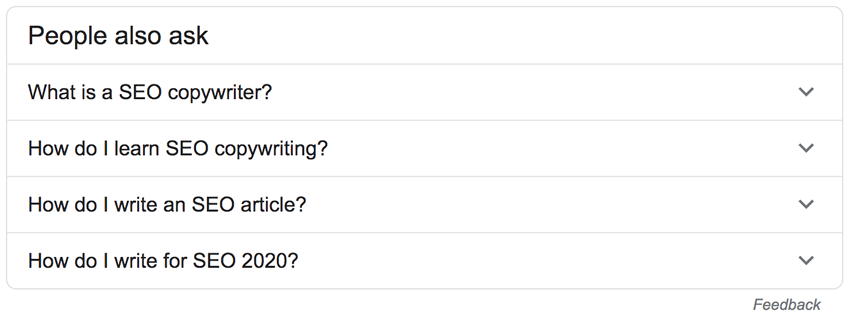
8. Search engines are getting smarter
Google and other search engines algorithms are improving daily. It’s almost impossible to figure out exactly how they rank websites, although some experts have a fairly good idea. The good news is that if you are using clean white hat techniques then you will see the benefits. Blackhat SEO tricks will see rankings fall as the algorithms improve.
It’s important to learn and keep yourself up to date with these changes so you can make sure your SEO is keeping up. Excellent resources such as Moz, Backlinko and Neil Patel’s blog will keep you up to scratch with all the latest developments so check these out regularly.
9. Long term traffic
Optimizing your content the right way can bring you consistent traffic for specific keywords for literally years. Evergreen content is content that remains relevant long after being published. This might be, for example, an informative guide around a specific subject related to your industry. If it is a well written, comprehensive piece that is sharable and optimized for search engines, then this can bring you a steady stream of organic traffic over a long period of time.
Another term used for this type of content is cornerstone content. While most of your blog content might be around latest industry news or tips, your cornerstone content should include your strongest keywords and be more detailed than your regular posts. You can also go back to this content periodically to update any information that may have changed.
10. It’s easy to measure success
Keeping an eye on your SEO progress is easy due to the free reporting tools you can use. The important thing is to set up these tools early. As soon as you have a website, you should link it to Google Analytics and Google Search Console. They will provide you with vital user data from day one.
Google Analytics tells you what content is performing best for you and what isn’t over any timescale. If you have an ecommerce website then you can also track and measure sales. Google Search Console lets you know how well your keywords are performing as well as keeping an eye on how Google crawls your website.
Image
Other tools we mentioned earlier such as SEMrush and MOZ will keep you up to date on how many backlinks you have acquired and if they are good or bad.
Also, all of your social media accounts give you statistics about your visitors. The same applies to email marketing tools such as MailChimp. All of these tools will offer you data that will help you measure your success.
Importance of SEO in digital marketing
Ultimately, SEO is about giving your website viewers a positive user experience. And by following SEO techniques, that is exactly what you are doing. Google and other search engines also want to give users the best experience possible and that is why they rank well optimized websites higher in their rankings. Their complicated algorithms are based on good SEO practices.
As you can see from our 10 examples above, SEO should already play an essential role in your digital marketing strategy. Businesses not using SEO techniques will fall behind their competition. That is why SEO is important for your business moving forward.
If you are not optimizing your website for search engines then there is no better time to start than right now. Use the excellent free SEO tools and resources to your advantage. I can promise you that if you do SEO the right way, then you will see the endless benefits they offer.

